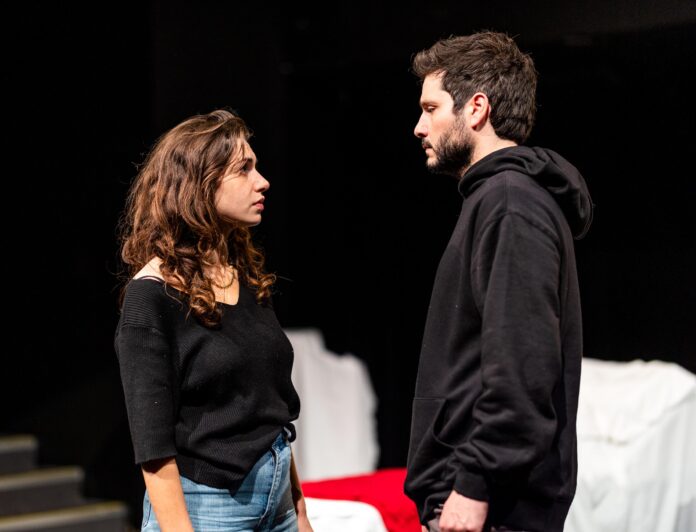In my youth mental illness of all shapes, shades and sizes was rarely mentioned. It was an aspect of the human condition that was judiciously swept under the rug and out of sight. My parents on occasion would remember returned soldiers from the Great War who suffered “shell shock”, the behavioural condition associated with trauma and, “what a terrible thing that must be”. In ordinary life (whatever that might be!) the phrase “mental health” is quite a recent addition to the lexicon. The film “The Three faces of Eve” released in 1957 was a factually based account (published in 1954) of an individual afflicted with what was then referred to as Multiple Personality Disorder. It was a cinema sensation of its day. Then Ken Kesey’s 1962 novel “One Flew over the Cuckoo’s Nest” became a much celebrated movie in 1975. In a way it was the catalyst that unlocked hitherto privately whispered family discussion.
In Anthony Neilson’s play “The Wonderful World of Dissocia” the state, or rather states, of mind of his central character Lisa are laid bare for all to see. Director Tom Filsell has guided his impressive cast in becoming the machinations of Lisa’s multifarious imagined scenarios. Nadia Talotta inhabits Lisa in a most natural and disarming manner. She is “the girl next door” with seemingly absolutely everything going for her. That she plays host to another universe in her mind is most likely evident only to those closest to her. Nadia’s performance throughout the roller-coaster of emotion in this play is one of utter professional ease and absolute believability in keeping, I’m sure, with that which the playwright intended. It is a wonderfully sustained piece of acting. Her boyfriend Vince, deftly played by Paul Pacillo is loyal, considerate and very patient indeed. It is interesting that he also portrays the Scapegoat in Lisa’s other world, a character who not only exhibits self-pity but also cajoles and threatens her most violently and vilely.
The two guards Nick Launchbury and Chris Gun (who both appear later as affable and kindly nursing staff) are well cast and paired and make a lively energetic duo. As Guards or Gatekeepers to the Kingdom (or is it Queendom?) of Dissocia they give fine performances sometimes comic, sometimes self-deprecatory but always quite bizarre. The State of Dissocia is on constant watch for the dreaded “Black Dog”. In this world Lisa is referred to as Queen Sarah in the repetitious and ironic chanting of “Queen Sarah, save us from the Black Dog King!” Nick also plays “Argument” and lends good voice, pace and timing to that character’s threatening behaviour. On the other hand Chris as “Inhibitions” threatens to let down more than just his hair!
Jessica Carroll brings real pragmatism to Lisa’s sister Dot. She is also the “Oathtaker” and then “Jane” in the alter universe, who wants to help and protect. It is as if “Jane” is a constructed extension in both influence and action of sibling Dot who, in real family life, appears to be the glue that holds the trio of herself, Lisa and their Mum together. Jessica produces a fine juggling act in each of her roles.
Marni Russo plays Lisa’s Mum in a frenetic fast talking manner. She sweetly sings an odd lullaby, the “Bear Song”, posing the question to Lisa, “Who will hold your paw?” Marni also plays the controller “Britney” of the “Lost, Lost Property Office” and is an architect of the chaotic “Hot Dog Stand” scene which closes act one. Again there seems to be a link via like behaviours between real Mum and bossy, controlling yet chaotic “Britney”. Whatever the case the performance of Marni is excellent in both scenarios.
Robert Baulderstone is initially Victor the man with Swiss movement time on both wrists. He introduces the notion to a confused Lisa that she has somewhere, somehow lost an hour of her time. So starts the quest to find and reclaim the time owing to her. Robert constructs a relaxed and confident performance throughout. (In a rather ironic and unplanned quirky twist we lost a little time at the beginning of this performance. The performance was abruptly halted due to a need to rectify a lighting program issue. We, the understanding audience, as well as Robert (Victor) and Nadia (Lisa) had to wait a short time for the problem to be rectified and the play to restart. Both actors handled this unforeseen event with consummate professionalism.) Chelsea Fernandez and Callum Hill both playing multiple minor roles ably make up the talented cast.
The second act changes tone altogether and is set entirely in a solitary room within a hospital ward. The characters in Lisa’s world of Dissocia are starkly replaced with medical staff and medicinal therapies familiar to us all. Rapid fire scenes depict snapshots of her progress or lack thereof. She is denied access to a phone as well as small items that might be used to self harm. Whilst she is carefully watched over and protected she is variously angry, frustrated, paranoid and eventually compliant. During this period of her treatment she poignantly states, referring to body, head and heart, “I am really trapped in here! – and here!- and here!”
The play poses the question as to how those of us with specific behavioural issues or a mental illness, condition or affliction might serve as functioning members of both family and community. Whilst the issues are most complex and certainly not always understood or even recognised it was an interesting visit to the theatre to see such a topic handled with care and respect. The audience obviously thought so and we all left with the hope that Lisa, with love and support from people like boyfriend Vince, would ultimately be victorious in her struggle.



